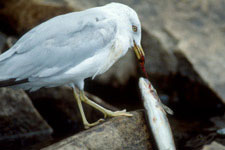DEC Investigates Death of Lake Ontario Water Birds
 The New York State Department of Environmental Conservation (DEC) announced that the agency is investigating the cause of the deaths of numerous water birds found along the shores of eastern Lake Ontario since Saturday, October 21, 2006. DEC’s Wildlife Pathology Unit is examining gulls, grebes and loons collected from Sodus Bay to Deer Creek Marsh. They will conduct tests for type E botulism and perform other clinical analyses on the birds. The New York State Department of Environmental Conservation (DEC) announced that the agency is investigating the cause of the deaths of numerous water birds found along the shores of eastern Lake Ontario since Saturday, October 21, 2006. DEC’s Wildlife Pathology Unit is examining gulls, grebes and loons collected from Sodus Bay to Deer Creek Marsh. They will conduct tests for type E botulism and perform other clinical analyses on the birds.Type E Botulism Type E botulism is a specific strain of botulism most commonly affecting fish-eating birds. The associated neurotoxin produced by actively growing bacterium paralyzes affected birds, which often drown. Ingestion of the toxin produced by the botulism bacterium can be harmful to humans who eat contaminated birds or fish. To date, type E botulism has not been found in any fish from Lake Ontario or the St. Lawrence River. Caution Advised Hunters and anglers are advised not to harvest waterfowl or fish that appear sick or are acting abnormally. Waterbirds affected by botulism toxin cannot fly, and their legs become paralyzed. They often propel themselves across the water and mudflats with their wings. Among other potential signs of sickness, a sick fish typically has a hard time remaining upright and swims on its side or belly up. If you must handle dead or dying fish or birds, wear rubber or plastic protective gloves and use plastic bags. Please report any discovery of dead or distressed fish or wildlife, such as water birds showing a condition known as "limberneck"—paralysis of the neck muscles—to one of the following DEC offices: Buffalo, 716-851-7010; Allegany, 716-372-0645; Avon, 585-226-2466; Syracuse, 315-426-7400; Cortland, 607-753-3095; Watertown, 315-785-2261, or Cape Vincent, 315-654-2147. For More: |














Comments on "DEC Investigates Death of Lake Ontario Water Birds"
post a comment